高考词汇词性变化规律1名词类变化(7页)
英语单词词性转换的基本规律
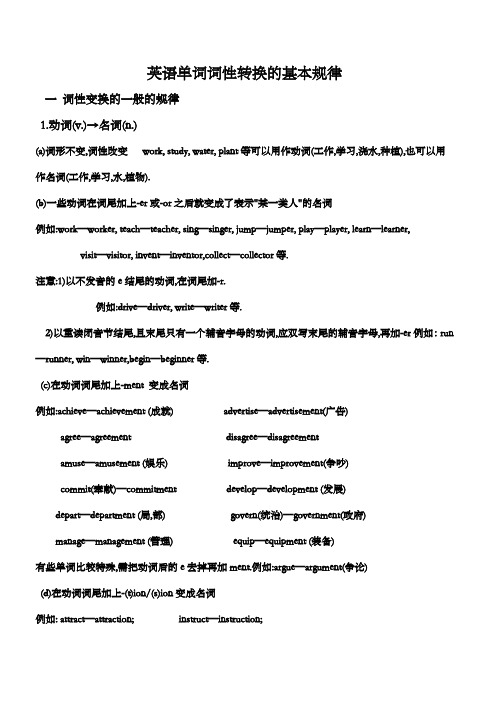
英语单词词性转换的基本规律一词性变换的一般的规律1.动词(v.)→名词(n.)(a)词形不变,词性改变work, study, water, plant等可以用作动词(工作,学习,浇水,种植),也可以用作名词(工作,学习,水,植物).(b)一些动词在词尾加上-er或-or之后就变成了表示"某一类人"的名词例如:work—worker, teach—teacher, sing—singer, jump—jumper, play—player, learn—learner, visit—visitor, invent—inventor,collect—collector等.注意:1)以不发音的e结尾的动词,在词尾加-r.例如:drive—driver, write—writer等.2)以重读闭音节结尾,且末尾只有一个辅音字母的动词,应双写末尾的辅音字母,再加-er例如:run —runner, win—winner,begin—beginner等.(c)在动词词尾加上-ment 变成名词例如:achieve—achievement (成就) advertise—advertisement(广告)agree—agreement disagree—disagreementamuse—amusement (娱乐) improve—improvement(争吵)commit(奉献)—commitment develop—development (发展)depart—department (局,部) govern(统治)—government(政府)manage—management (管理) equip—equipment (装备)有些单词比较特殊,需把动词后的e去掉再加ment.例如:argue—argument(争论)(d)在动词词尾加上-(t)ion/(s)ion变成名词例如: attract—attraction; instruct—instruction;invent—invention discuss—discussion;express—expression educate—education;graduate—graduation; operate—operation (去e再加"ion")compete—competition; organize—organization (把e改成其他字母再加"tion")decide—decision conclude—conclusion (把de改为s再加"ion")describe—description描写,描绘(这是特例,不规则变化)(e)在动词词尾加上-ance变成名词例如: appear—appearance (外貌;出现) perform—performance (演出)accept—acceptance (接受)(f)在动词词尾加-ing变成名词(方法与动词变为现在分词的方法相同)例如: meet—meeting build—building wait—waitingbathe—bathing say—saying(谚语) mean—meaningend —ending train —training wash—washing注意:以重读闭音节结尾,且末尾只有一个辅音字母的动词,应双写末尾的辅音字母,再加-ing如:swim —swimming shop—shopping begin—beginning(g)其他一些比较特殊的变化例如: Beg(乞讨)—beggar(乞丐) behave(行为举止)—behaviorknow(知道)—knowledge(知识) fly—flight (飞行)heat (加热)—heat(热量) hit (撞击)—hit( 轰动一时的人或物,碰撞)mix (混合)—mixture(混合物) press(按,压)—pressure(压力)sit(坐)—seat (座位) succeed—success(成功)tour—tour(旅游)/ tourist (游客)2.动词(v.)→形容词(adj.)(a)动词后面加able,以e结尾的动词则去e加able,表示具有此性质,特点或属性.例如: afford-affordable;love-lovable(b)动词后面加ed,以e结尾的动词则直接加d,表示被动性的属性或特点.例如: scatter-scattered use-used(c)不规则的动词则必须记忆,记住其过去分词形式.规律不大,意义同(b).3.名词(n.)→形容词(adj.)(a)在名词后面加-y可以变成形容词(尤其是一些与天气有关的名词)例如: rain—rainy, cloud—cloudy, wind—windy, snow—snowy,health—healthy, luck—lucky,anger—angry guilt—guilty(内疚的)tourist—touristy(游客多的) , salt (盐)—salty (咸的)silk(丝绸)—silky(丝绸般的), sleep—sleepy (昏昏欲睡的)注意:1)如果以重读闭音节结尾,且词尾只有一个辅音字母,这时应双写辅音字母再加"-y". 如: sun—sunny, fun—funny, fog—foggy(有雾的), fur—furry(毛皮的)2)少数以不发音的e结尾的名词变为形容词时,应去掉e再加"-y".如: noise—noisy, ice—icy, shine—shiny(发亮的), taste(口味)—tasty(甜的)(b)名词后面加-ed,以e结尾的直接加d.例如: spot(斑点)—spotted(有斑点的); talent—talented (有天赋的)organize—organized 有组织的; balance—balanced(平衡的)(c)一些抽象名词在词尾加-ful可以变为形容词例如:care—careful, thank—thankful, help—helpful,use—useful, meaning—meaningful(d)在名词后加-less构成含有否定意义的形容词例如:care—careless(粗心的), use—useless(无用的)hope—hopeless(没希望的),home—homeless(无家可归的)(e)一些以-ce结尾的名词,把-ce改为-t变成形容词例如: difference—different, silence—silent, confidence—confident(f).在名词后加-ly变为形容词例如: friend—friendly, love—lovely, live---lively(g).在名词后加-ous变为形容词例如: danger—dangerous(h)名词后面加-al变为形容词例如: music—musical; medicine—medical (这个比较特殊)(i)名词后面加-able变为形容词,如果以e结尾就去e再加"-able".例如: adjust—adjustable 可调整的value—valuable有价值的(j)名词后面加-en变成形容词例如: wood—wooden 木制的wool—woolen 羊毛的(k)一些表示国家的名词可以在词尾加-ese, -ish或-n构成表示国籍,语言的形容词例如:China—Chinese, Japan—Japanese, England—English,America—American, India—Indian, Australia —Australian (注意Canada—Canadian)4.形容词(adj.)→副词(adv.)▲一般在形容词的词尾加-ly可以变成副词例如: quick—quickly, slow—slowly, loud—loudly, sudden—suddenly 等但是,以下几点值得注意:(a) 一些以"辅音字母+y"结尾的形容词,要把y改为i再加-ly例如: happy—happily, angry—angrily, lucky—luckily, heavy—heavily, noisy—noisily(b) 有些以-ble或-le结尾的形容词,去掉e加-y例如:possible—possibly, terrible—terribly(c)少数以e结尾的形容词,要去掉e再加-ly例如: true—truly但绝大多数以e结尾的形容词仍然直接加-ly 例如: polite—politely, wide—widely(d)以-l结尾的形容词变为副词时要在词尾加-ly,以-ll结尾的才在词尾只加-y.例如: usual—usually, careful—carefully, useful—usefullyfull—fully (以-ll结尾的才只加y)二. 派生:指由一个词根加上前缀和(或)后缀构成另一个词的构词形式。
英语单词词性转变的一般规律

英语单词词性转变的一般规律英语单词词性转变的一般规律1.动词(v.)→名词(n.)(a)词形不变,词性改变例如:work, study, water, plant等可以用作动词(工作,学习,浇水,种植),也可以用作名词(工作,学习,水,植物).(b)一些动词在词尾加上-er或-or之后就变成了表示"某一类人"的名词例如:work—worker, teach—teacher, sing—singer,jump—jumper, play—player, learn—learner,visit—visitor, invent—inventor, collect—collector等.注意:1)以不发音的e结尾的动词,在词尾加-r.例如:drive—driver, write—writer等.2)以重读闭音节结尾,且末尾只有一个辅音字母的动词,应双写末尾的辅音字母,再加-er例如:run—runner, win—winner, begin—beginner等.(c)在动词词尾加上-ment 变成名词例如:achieve—achievement (成就) advertise—advertisement 例如:argue—argument(争论)(d)在动词词尾加上-(t)ion/(s)ion变成名词例如: attract—attraction; instruct—instruction; invent—inventiondiscuss—discussion; express—expressioneducate—education; graduate—graduation; operate—operation (去e再加"ion")compete—competition; organize—organization (把e改成其他字母再加"tion")decide—decision conclude—conclusion (把de改为s再加"ion")describe—description描写,描绘 (这是特例,不规则变化)(e)在动词词尾加上-ance变成名词例如: appear—appearance (外貌;出现)perform—performance (演出)accept—acceptance (接受)(f)在动词词尾加-ing变成名词 (方法与动词变为现在分词的方法相同)例如:meet—meeting build—building wait—waitingbathe—bathing say—saying(谚语) mean—meaningend —ending train —training wash—washing注意:以重读闭音节结尾,且末尾只有一个辅音字母的动词,应双写末尾的辅音字母,再加-ing如:swim—swimming shop—shopping begin—beginning(g)其他一些比较特殊的变化例如: Beg(乞讨)—beggar(乞丐) behave(行为举止)—behavior know(知道)—knowledge(知识) fly—flight (飞行)heat (加热)—heat(热量) hit (撞击)—hit( 轰动一时的人或物,碰撞) mix (混合)—mixture(混合物) press(按,压)—pressure(压力)sit(坐)—seat (座位) succeed—success(成功)tour—tour(旅游)/ tourist (游客)2.动词(v.)→形容词(adj.)(a)动词后面加able,以e结尾的动词则去e加able,表示具有此性质,特点或属性.例如: afford-affordable;love-lovable(b)动词后面加ed,以e结尾的动词则直接加d,表示被动性的属性或特点.例如: scatter-scattereduse-used(c)不规则的动词则必须记忆,记住其过去分词形式.规律不大,意义同(b).3.名词(n.)→形容词(adj.)(a)在名词后面加-y可以变成形容词(尤其是一些与天气有关的名词)例如: rain—rainy, cloud—cloudy, wind—windy, snow—snowy, health—healthy, luck—lucky, anger—angry guilt—guilty(内疚的)tourist—touristy(游客多的) , salt (盐)—salty (咸的)silk(丝绸)—silky(丝绸般的), sleep—sleepy (昏昏欲睡的)注意:1)如果以重读闭音节结尾,且词尾只有一个辅音字母,这时应双写辅音字母再加"-y".如: sun—sunny, fun—funny, fog—foggy(有雾的), fur—furry(毛皮的)2)少数以不发音的e结尾的名词变为形容词时,应去掉e再加"-y".如: noise—noisy, ice—icy, shine—shiny(发亮的), taste(口味)—tasty(甜的)(b)名词后面加-ed,以e结尾的直接加d.例如: spot(斑点)—spotted(有斑点的); talent—talented (有天赋的)organize—organized 有组织的; balance—balanced(平衡的)(c)一些抽象名词在词尾加-ful可以变为形容词例如:care—careful, thank—thankful, help—helpful,use—useful, meaning—meaningful(d)在名词后加-less构成含有否定意义的形容词例如:care—careless(粗心的), use—useless(无用的)hope—hopeless(没希望的),home—homeless(无家可归的)(e)一些以-ce结尾的名词,把-ce改为-t变成形容词例如: difference—different, silence—silent, confidence—confident(f).在名词后加-ly变为形容词例如: friend—friendly, love—lovely, live---lively(g).在名词后加-ous变为形容词例如: danger—dangerous(h)名词后面加-al变为形容词例如: music—musical; medicine—medical (这个比较特殊)(i)名词后面加-able变为形容词,如果以e结尾就去e再加"-able".例如: adjust—adjustable 可调整的value—valuable有价值的(j)名词后面加-en变成形容词例如: wood—wooden 木制的wool—woolen 羊毛的(k)一些表示国家的名词可以在词尾加-ese, -ish或-n构成表示国籍,语言的形容词例如:China—Chinese, Japan—Japanese, England—English, America—American, India—Indian, Australia —Australian(注意Canada—Canadian)4..形容词(adj.)→副词(adv.)▲一般在形容词的词尾加-ly可以变成副词例如: quick—quickly, slow—slowly, loud—loudly, sudden—suddenly 等但是,以下几点值得注意:(a) 一些以"辅音字母+y"结尾的形容词,要把y改为i再加-ly例如: happy—happily, angry—angrily, lucky—luckily, heavy—heavily, noisy—noisily(b) 有些以-ble或-le结尾的形容词,去掉e加-y例如:possible—possibly, terrible—terribly(c)少数以e结尾的形容词,要去掉e再加-ly例如: true—truly但绝大多数以e结尾的形容词仍然直接加-ly 例如: polite—politely, wide—widely(d)以-l结尾的形容词变为副词时要在词尾加-ly,以--ll结尾的才在词尾只加-y.例如: usual—usually, careful—carefully, useful—usefullyfull—fully (以-ll结尾的才只加y)英语词汇后缀系列(一)——形容词后缀able以“-able”结尾的形容词一般有两种情况:(1)v.+able→adj. 以这种方式构成的形容词其意义为“能……的”、“可以(被)……的”、“适合于……的”、“值得……的”等,即有被动含义。
名词变化规则总结大全
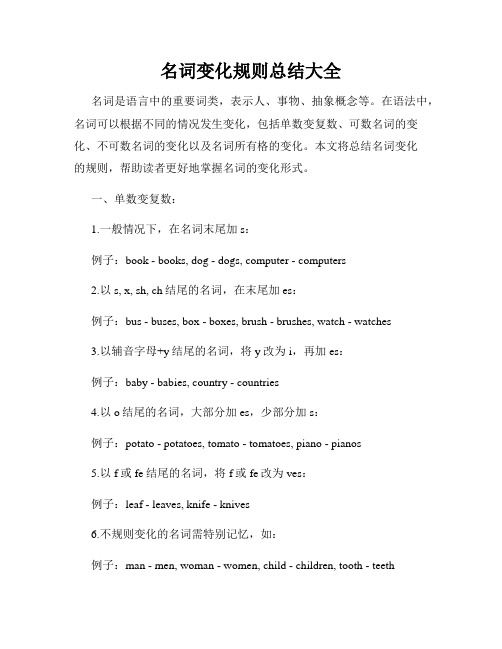
名词变化规则总结大全名词是语言中的重要词类,表示人、事物、抽象概念等。
在语法中,名词可以根据不同的情况发生变化,包括单数变复数、可数名词的变化、不可数名词的变化以及名词所有格的变化。
本文将总结名词变化的规则,帮助读者更好地掌握名词的变化形式。
一、单数变复数:1.一般情况下,在名词末尾加s:例子:book - books, dog - dogs, computer - computers2.以s, x, sh, ch结尾的名词,在末尾加es:例子:bus - buses, box - boxes, brush - brushes, watch - watches3.以辅音字母+y结尾的名词,将y改为i,再加es:例子:baby - babies, country - countries4.以o结尾的名词,大部分加es,少部分加s:例子:potato - potatoes, tomato - tomatoes, piano - pianos5.以f或fe结尾的名词,将f或fe改为ves:例子:leaf - leaves, knife - knives6.不规则变化的名词需特别记忆,如:例子:man - men, woman - women, child - children, tooth - teeth二、可数名词的变化:1.可数名词有单数和复数两种形式,根据具体的语境决定名词的单复数形式。
例子:I have a book.(我有一本书。
)We have three books.(我们有三本书。
)2.可数名词的复数形式可以表示多个,也可以表示总体。
当表示总体时,不加任何限定词。
例子:I love cats.(我喜欢猫。
)Cats are lovely animals.(猫是可爱的动物。
)三、不可数名词的变化:1.不可数名词没有复数形式,表示一种无法分割或无法数清的事物。
例子:water(水)、milk(牛奶)、information(信息)2.不可数名词可以与量词连用表示数量。
高考词汇词性变化规律(含名动形副和其他)

高考词汇词性变化规律(1):名词类变化1. 以后缀-ce结尾的名词后缀变为以-ent后缀结尾的形容词confidence→confident 自信的difference→different 不同的evidence 证据→evident 明显的independence→independent独立的intelligence智力→intelligent聪明的patience→patient 有耐心的silence→silent 沉默的violence→violent 暴力的2. 以后缀-ency结尾的名词变为以-ent 后缀结尾的形容词emergency →emergent 紧急的fluency →fluent 流利的;流畅的frequency 频率→frequent 频繁的efficiency→efficient 有效率的3. 名词+-y 后缀变为形容词anger→angry 生气的cloud→cloudy 多云的dirt→dirty 脏的dust→dusty 布满尘土的ease→easy 容易的;安易的fog→foggy 有雾的frost→frosty 结霜的;严寒的greed→greedy 贪吃的;贪婪的guilt→guilty 内疚的;有罪的health→healthy 健康的hunger→hungry 饥饿的ice→icy 结冰的mess→messy 杂乱的mist→misty 有雾的noise→noisy 吵闹的;嘈杂的salt→salty 咸的sleep→sleepy 困的snow→snowy 有雪的storm→stormy 暴风雨的sun→sunny 晴朗的taste→tasty 可口的;好吃的thirst→thirsty 渴的;渴望的wealth→wealthy 富有的wind→windy 有风的4. 名词+-ly 后缀变形容词year→yearly 每年的brother→brotherly 兄弟般的day→daily 每天的friend→friendly 友好的month→monthly 每月的quarter→quarterly 每季的week→weekly 每周的5. 名词+-al 后缀变为形容词agriculture→agricultural 农业的benefit→beneficial 有益的commerce→commercial 商业的2 convention→conventional 传统的culture→cultural 文化的environment→environmental 环境的face→facial 表面的music→musical 音乐的nation→national 国家的nature→natural 自然的;天然的office→official 官方的origin→original 原来的profession→professional 专业的season→seasonal 季节的;季节性的society→social 社会的tradition→traditional 传统的6. 名词+-ous 后辍变为形容词adventure→adventurous 冒险的danger→dangerous 危险的humour→humorous 幽默的mountain→mountainous 多山的poison→poisonous 有毒的7. 动词+-er 后缀变为指物的名词cooker 炊具1counter 柜台drawer 抽屉receiver 听筒;话筒speaker 扬声器typewriter 打字机8. 名词加后缀-ician 表示人electrician n.电工magician n.魔术师musician n.音乐家physician n.内科医生politician n.政治家technician n.技术员9. 以-ist 后缀结尾的名词,表示人,...家,...者art→artist 艺术家biology→biologist 生物学家journal→journalist 新闻工作者;记者physics→physicist 物理学家piano→pianist 钢琴家psychology→psychologist 心理学家science→scientist 科学家social→socialist 社会主义者special→specialist 专家tour→tourist 游客10. 以后缀-ology结尾的名词,表示...学archaeology 考古学biology 生物学ecology 生态学geology 地质学psychology 心理学sociology 社会学technology 技术;工艺11. 名词+-ic 后缀结尾,变为形容词drama→dramatic 戏剧(性)的energy→energetic 精力充沛的enthusiasm→enthusiastic 热情的romance→romantic 浪漫的science→scientific 科学的sympathy→sympathetic 同情的12. 名词+-hood 后缀变为名词adult→adulthood 成年boy→boyhood 少年时代brother→brotherhood 手足之情child→childhood 童年man→manhood 男子气概neighbour→neighbourhood邻里;街坊13. 名词+-ship 后缀结尾,变为抽象名词championship 冠头军衔friendship 友谊hardship 困苦;苦难leadership 领导地位;领导才能membership 成员资格relationship 关系scholarship 奖学金高考词汇词性变化规律(2):动词类变化1.动词+后缀-y变为名词deliver→delivery 运送discover→discovery 发现recover→recovery 康复;恢复2.动词+后缀-ing 变为名词begin→beginning开始;开端build→building建筑(物)cross→crossing十字路口end→ending 结局;结尾engine→engineering 工程feel→feeling 感觉hear→hearing 听力market→marketing促销meet →meeting 会议paint→painting 绘画;油画2spend→spending 花销suffer→suffering 苦难train→training 训练;培养3. 动词+后缀-ment变为名词acquire→acquirement n. 取得accomplish→accomplishment 成就achieve→achievement 成就adjust→adjustment 调整;调节amuse→amusement 愉快;快乐;消遣announce→announcement宣告;述说appoint→appointment约会;预约;任命argue→argument 争论arrange→arrangement 安排assess→assessment 评估assign→assignment 分配;任务astonish→astonishment 惊讶develop→development 发展disappoint→disappointment 失望embarrass→embarrassment 尴尬employ→employment 雇用enjoy→enjoyment 享受;欢乐entertain→entertainment 款待;娱乐equip→equipment 设备establish→establishment 建立govern→government 统治;政府improve→improvement 提高judge→judgement 判断move→movement 运动;移动punish→punishment 惩罚settle→settlement 定居;解决state→statement 陈述;说明4. 动词+后缀-ive变为形容词act→active 积极的attract→attractive 吸引人的cooperate→cooperative 合作的impress→impressive 给人印象深刻的protect→protective 保护的relate→relative 相关的sense→sensitive 敏感的object→objective 客观的negative 消极的passive 被动的positive 积极的subjective 主观的5.动词+后缀-able变为形容词accept→acceptable 可接受的adjust→adjustable 可调节的admire→admirable 令人钦佩的afford→affordable 负担得起的change→changeable 易变的comfort→comfortable 舒服的consider→considerable 重要的;相当大的desire→desirable 值得做的;可取的enjoy→enjoyable 令人愉快的favour→favourable 赞成的;有利的forget→forgettable 健忘的honour→honourable 可敬的;光荣的reach→reachable 可获得的;可达到的reason→reasonable 合理的rely→reliable 可靠的;可信赖的remark→remarkable 不平凡的suit→suitable 合适的understand→understandable可理解的value→valuable 宝贵的6.动词+后缀-ed变为形容词absorb→absorbed专心的;聚精会神的accustom→accustomed 习惯的balance→balanced 平衡的bury→buried 专心的complicate→complicated 复杂的determine→determine坚定的;有决心的devote→devoted 忠实的experience→experienced 有经验的learn→learned 博学的limit→limited 有限的organize→organized 有组织的suppose→supposed 应该的3relate→related 相关的skill→skilled 熟练的unite→united 联合的;统一的7.动词+后缀-ing/+-ed变为形容词amuse→amusing 好笑的;有趣的→amused 愉快的astonish→astonishing 令人惊讶的→astonished 感到惊讶的bore→boring 令人厌烦的→bored 厌烦的confuse→confusing 令人迷惑的→confused 感到迷惑的convince→convincing 令人信服的→convinced 坚信不移的depress→depressing 令人沮丧的→depressed 沮丧的disappoint→disappointed 失望的→disappointing 令人失望的disturb→disturbing 令人不安的;→disturbed 扰乱的;精神失常的embarrass→embarrassing 令人尴的→embarrassed尴尬的excite→exciting 令人兴奋的→excited 兴奋的frighten→frightening 令人害怕的→frightened 害怕的relax→relaxing 使人放松的→relaxed 轻松的satisfy→satisfying 令人满意的→satisfied 对……满意的shock→shocking 令人震惊的→shocked 震惊的surprise→surprising 令人吃惊的→surprised 吃惊的tire→tiring 令人疲劳的→tired 疲劳的8. 动词+后缀-tion变为名词accelerate→acceleration 加速accumulate→accumulation 积累adapt→adaptation 适应;改编addict→addiction 沉溺;嗜好admire→admiration 羡慕advocate→advocation 拥护apply→application 申请appreciate→appreciation 感激;欣赏assume→assumption 假定;设想celebrate→celebration 庆祝classify→classification 分类;归类combine→combination 联合congratulate→congratulation 祝贺construct→construction 建筑物consume→consumption 消费contradict→contradiction 反驳contribute→contribution 贡献cooperate→cooperation 合作correct→correction 改正;纠正create→creation 创造;创建declare→declaration 宣言;公告decorate→decoration 装饰decorate→decoration 装饰determine→determination 决心digest→digestion 消化elect→election 竞选;选举erupt→eruption 火山爆发evaluate→evaluation 评估exhibit→exhibition 展览;展览会expect→expectation 期望;期待fascinate→fascination 魅力;入迷graduate→graduation 毕业graduate→graduation 毕业hesitate→hesitation 犹豫;踌躇imagine→imagination 想象immigrate→immigration 迁移;移居indicate→indication 指示;暗示infect→infection 传染interrupt→interruption 中断object→objection 反对occupy→occupation 占领;占据organize→organization 组织pollute→pollution 污染predict→prediction 预言prepare→preparation 准备protect→protection 保护4recommend→recommendation 推荐;介绍reflect→reflection 思考;反映regulate→regulation 规则;规章reject→rejection 拒绝;抛弃relax→relaxation 放松satisfy→satisfaction 满意;满足starve→starvation 挨饿;饿死substitute→substitution 代替;取代translate→translation 翻译transport→transportation 交通9.动词+后缀-ure变为名词press→pressure 压力please→pleasure 乐事;快乐expose→exposure 暴露;揭发fail→failure 失败mix→mixture 混合物10.动词+后缀-sion变为名词admit→admission 容许;承认permit→permission 允许impress→impression 印象express→expression 表情;表达revise→revision 复习possess→possession 拥有conclude→conclusion 结论confuse→confusion 困惑;混淆decide→decision 决定11.动词/形容词+后缀-ance变为名词guide→guidance 指导tolerate→tolerance 宽容ignore→ignorance 无知;愚昧appear→appearance 出现important→importance 重要(性) elegant→elegance 优雅大方assist→assistance 援助resist→resistance 抵抗guide→guidance 指导annoy→annoyance 恼怒高考词汇词性变化规律(3)形容词类变化1. 形容词+后缀-ity变为名词electric→electricity 电;电流;电学equal→equality 平等major→majority 大多数popular→popularity 受欢迎;流行real→reality 现实secure→security 安全similar→similarity 相似点2. 以后缀-ity结尾的高频名词cruelty 残忍diversity 多样性necessity 必需品;需要possibility 可能性security 安全similarity 相似(性)3. 形容词+后缀-en变为动词bright→brighten 使愉快;使明亮broad→broaden 加宽;拓宽dark→darken 使变暗deep→deepen 加深;使变深fright→frighten (使)惊吓hard→harden 使变硬light→lighten 使变轻long→lengthen 加长loose→loosen (使)变松;放松;松开quick→quicken 加快ripe→ripen 变成熟;使成熟sharp→sharpen 磨快;使锋利short→shorten 变短;缩短soft→soften 使变软strong→strengthen 加强weak→weaken 使变弱wide→widen 加宽;拓宽4. 形容词+后缀-th 变为名词deep→depth深;深处5grow→growth成长long→length长;长度strong→strength力量true→truth真理warm→warmth温暖wide→width宽度5. 形容词+后缀-ness变为名词aware→awareness 意识careless→carelessness 粗心大意conscious→consciousness 知觉dark→darkness 黑暗eager→eagerness 渴望happy→happiness 幸福;高兴kind→kindness 仁慈;好意lonely→loneliness 孤独rude→rudeness 粗鲁sad→sadness 悲哀;悲伤sick→sickness 疾病weak→weakness 弱点;虚弱willing→willingness 愿意6. 以后缀-ious 结尾的形容词ambitious 有雄心的;野心勃勃的cautious 小心的;谨慎的conscious 有意识的envious 忌妒的;猜忌的mysterious 神秘的religious 宗教上的;虔诚的7. 以后缀-ical结尾的形容词economical 经济的;节约的electrical 与电有关的historical 与历史有关的logical 逻辑的magical 神奇的;像变魔术似的musical 音乐的;悦耳的political 政治的8. 形容词+后缀-ly变为副词fluent→fluently 流利地frequent→frequently 频繁地;经常地actual→actually 实际上entire→entirely 完全;全部地gradual→gradually 逐渐地fortunate→fortunately 幸运地final→finally 最后extreme→extremely 极其词性变化规律(4):反义词词性变化之反义词1.动词→前缀dis-+动词agree→dis agree 不同意appear→dis appear 消失appoint→dis appoint 使失望approve→dis approve 反对;不赞成comfort→dis comfort 使不舒适cover→dis cover 发现like→dis like 不喜欢2.形容词→前缀in- +形容词accurate→in accurate 不精确的adequate→in adequate 不充分的appropriate→in appropriate不合适的expensive→in expensive便宜的experienced→in experienced 经验不足的3.形容词→前缀im-+形容词patient→im patient 不耐心的polite→im polite 没礼貌的possible→im possible 不可能的practical→im practical 不实用的proper→im proper 不合适的4.形容词→前缀un- +形容词变able→un able 不能的aware→un aware 不知道的believable→un believable不可相信的certain→un certain 不确定的clear→un clear 不清楚的comfortable→un comfortabl不舒服的6common→un common 不常有的conscious→un conscious 失去知觉的fair→un fair 不公平的forgettable→un forgettable 难忘的fortunate→un fortunate 不幸的fit→un fit 不合适的friendly→un friendly 不友好的happy→un happy 不高兴的;不幸福的known→un known 无名的likely→un likely 不可能的lucky→un lucky 不幸的necessary→un necessary 不必要的pleasant→un pleasant 不愉快的fortunate→un fortunate 不幸的important→un important 不重要的usual→un usual 不寻常的willing→un willing 不情愿的5.名词→名词+后缀-less 构成的形容词aim→aim less无目的的care→care less粗心大意的count→count less无数的doubt→doubt less无疑的end→end less无尽的harm→harm less无害的help→help less无助的home→home less无家可归的hope→hope less无希望的job→job less 失业的limit→limit less无限的rest→rest less不安的use→use less无用的6.动词→前缀mis-+动词构成的动词take→mis take 误会understand→mis understand 误解use→mis use 误用;滥用lead→mis lead 误导trust→mis trust 不信任高考词汇词性变化规律(5):其他变化类型归纳1. 使动用法“前缀en-+形容词/名词”变为动词,表示“使...”rich→enrich 使充实able→enable 使能够large→enlarge 使扩大sure→ensure 确保;担保danger→endanger 使……遭遇危险title→entitle 给……起题目/命名courage→encourage 鼓励2. 含前缀fore-的单词,表示“前,提前”forecast vt. 预报;预测foresee vt. 预见;预料;预知foreword n. 前言forehead n. 额头forearm n. 前臂forehead n. 额头forearm n. 前臂forecast vt. 预报foresee vt. 预见;预知foreword n. 前言foretell v. 预言;预示3. 加后缀-ward表示方位词,表示“向...”southward 向南northward 向北eastward 向东westward 向西upward 向上backward 向后4. 以后缀-ify 结尾的动词simple→simplify 简化beauty→beautify 美化pure→purify 净化identity→identify 鉴定;识别出7class→classify 分类5. re-前缀+动词变为动词,表示“再;又”cycle→recycle 再利用;回收利用use→reuse 重新使用build→rebuild 重建write→rewrite 重写tell→retell 复述6. 男女有别steward 乘务员;服务员stewardess 女乘务员waiter 男服务员waitress 女服务员actor 男演员actress 女演员host 男主人hostess 女主人7. 现在分词/过去分词用作介词或连词assume→assuming 假设;假定(连词)include→including 包含;包括(介词)suppose→supposing 假设;假如(连词)provide→provided/providing 假设;如果consider→considering 鉴于;考虑到(连词)concern→concerning 关于(介词)give→given考虑到(介词)8。
英语单词词性转换的基本规律

英语单词词性转换的基本规律(1.动词(v.)→名词(n.)(a)词形不变,词性改变例如:work, study, water, plant等可以用作动词(工作,学习,浇水,种植),也可以用作名词(工作,学习,水,植物).(b)一些动词在词尾加上-er或-or之后就变成了表示"某一类人"的名词例如:work—worker, teach—teacher, sing—singer,jump—jumper, play—player, learn—learner,visit—visitor, invent—inventor, collect—collector等.注意:1)以不发音的e结尾的动词,在词尾加-r.例如:drive—driver, write—writer等.2)以重读闭音节结尾,且末尾只有一个辅音字母的动词,应双写末尾的辅音字母,再加-er例如:run—runner, win—winner, begin—beginner等.(c)在动词词尾加上-ment 变成名词例如:achieve—achievement (成就)advertise—advertisement//advertising(广告)agree—agreement disgree—disagreementamuse—amusement (娱乐) improve—improvement(争吵)commit(奉献)—commitment develop—development (发展) depart—department (局,部) govern(统治)—government(政府) manage—management (管理) equip—equipment (装备)有些单词比较特殊,需把动词后的e去掉再加ment.例如:argue—argument(争论)(d)在动词词尾加上-(t)ion/(s)ion变成名词例如: attract—attraction; instruct—instruction;invent—invention discuss—discussion;express—expression educate—education;graduate—graduation; operate—operation (去e再加"ion")compete—competition; organize—organization (把e改成其他字母再加"tion")decide—decision conclude—conclusion (把de改为s再加"ion")describe—description描写,描绘 (这是特例,不规则变化)(e)在动词词尾加上-ance变成名词例如: appear—appearance (外貌;出现)perform—performance (演出)accept—acceptance (接受)(f)在动词词尾加-ing变成名词 (方法与动词变为现在分词的方法相同)例如:meet—meeting build—building wait—waitingbathe—bathing say—saying(谚语) mean—meaningend —ending train —training wash—washing注意:以重读闭音节结尾,且末尾只有一个辅音字母的动词,应双写末尾的辅音字母,再加-ing如:swim—swimming shop—shopping begin—beginning(g)其他一些比较特殊的变化例如: Beg(乞讨)—beggar(乞丐) behave(行为举止)—behaviorknow(知道)—knowledge(知识) fly—flight (飞行)heat (加热)—heat(热量) hit (撞击)—hit( 轰动一时的人或物,碰撞)mix (混合)—mixture(混合物) press(按,压)—pressure(压力)sit(坐)—seat (座位) succeed—success(成功)tour—tour(旅游)/ tourist (游客)2.动词(v.)→形容词(adj.)(a)动词后面加able,以e结尾的动词则去e加able,表示具有此性质,特点或属性.例如: afford-affordable;love-lovable(b)动词后面加ed,以e结尾的动词则直接加d,表示被动性的属性或特点.例如: scatter-scattered use-used (赵科翔,注意下,这个就是我们所讲的非谓语动词作定语的情况)(c)不规则的动词则必须记忆,记住其过去分词形式.规律不大,意义同(b).3.名词(n.)→形容词(adj.)(a)在名词后面加-y可以变成形容词(尤其是一些与天气有关的名词)例如: rain—rainy, cloud—cloudy, wind—windy, snow—snowy,health—healthy, luck—lucky, anger—angry guilt—guilty(内疚的)tourist—touristy(游客多的) , salt (盐)—salty (咸的)silk(丝绸)—silky(丝绸般的), sleep—sleepy (昏昏欲睡的)注意:1)如果以重读闭音节结尾,且词尾只有一个辅音字母,这时应双写辅音字母再加"-y".如: sun—sunny, fun—funny, fog—foggy(有雾的), fur—furry(毛皮的)2)少数以不发音的e结尾的名词变为形容词时,应去掉e再加"-y".如: noise—noisy, ice—icy, shine—shiny(发亮的), taste(口味)—tasty(甜的)(b)名词后面加-ed,以e结尾的直接加d.例如: spot(斑点)—spotted(有斑点的); talent—talented (有天赋的)organize—organized 有组织的; balance—balanced(平衡的)(c)一些抽象名词在词尾加-ful可以变为形容词例如:care—careful, thank—thankful, help—helpful,use—useful, meaning—meaningful(d)在名词后加-less构成含有否定意义的形容词例如:care—careless(粗心的), use—useless(无用的)hope—hopeless(没希望的),home—homeless(无家可归的)(e)一些以-ce结尾的名词,把-ce改为-t变成形容词例如: difference—different, silence—silent, confidence—confident(f).在名词后加-ly变为形容词例如: friend—friendly, love—lovely, live---lively(g).在名词后加-ous变为形容词例如: danger—dangerous(h)名词后面加-al变为形容词例如: music—musical; medicine—medical (这个比较特殊)(i)名词后面加-able变为形容词,如果以e结尾就去e再加"-able".例如: adjust—adjustable 可调整的 value—valuable有价值的(j)名词后面加-en变成形容词例如: wood—wooden 木制的 wool—woolen 羊毛的(k)一些表示国家的名词可以在词尾加-ese, -ish或-n构成表示国籍,语言的形容词例如: China—Chinese, Japan—Japanese, England—English,America—American, India—Indian, Australia —Australian(注意Canada—Canadian)4.形容词(adj.)→副词(adv.)▲一般在形容词的词尾加-ly可以变成副词例如: quick—quickly, slow—slowly, loud—loudly, sudden—suddenly 等但是,以下几点值得注意:(a) 一些以"辅音字母+y"结尾的形容词,要把y改为i再加-ly例如: happy—happily, angry—angrily, lucky—luckily, heavy—heavily, noisy—noisily(b) 有些以-ble或-le结尾的形容词,去掉e加-y例如:possible—possibly, terrible—terribly(c)少数以e结尾的形容词,要去掉e再加-ly例如: true—truly但绝大多数以e结尾的形容词仍然直接加-ly 例如: polite—politely, wide—widely (d)以-l结尾的形容词变为副词时要在词尾加-ly,以-ll结尾的才在词尾只加-y.例如: usual—usually, careful—carefully, useful—usefullyfull—fully (以-ll结尾的才只加y)。
词性转换规律
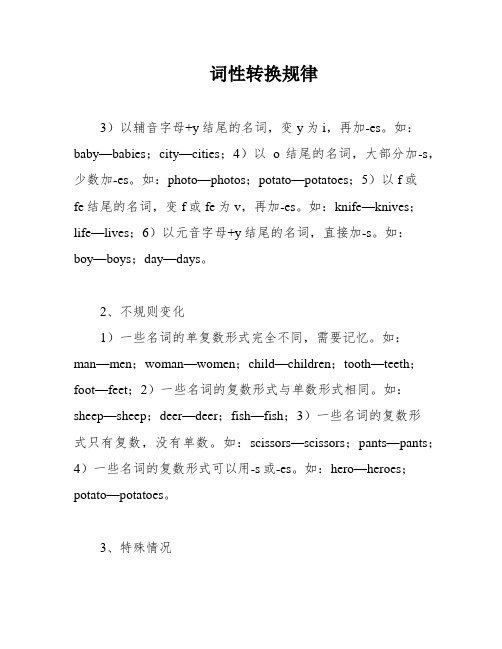
词性转换规律3)以辅音字母+y结尾的名词,变y为i,再加-es。
如:baby—babies;city—cities;4)以o结尾的名词,大部分加-s,少数加-es。
如:photo—photos;potato—potatoes;5)以f或fe结尾的名词,变f或fe为v,再加-es。
如:knife—knives;life—lives;6)以元音字母+y结尾的名词,直接加-s。
如:boy—boys;day—days。
2、不规则变化1)一些名词的单复数形式完全不同,需要记忆。
如:man—men;woman—women;child—children;tooth—teeth;foot—feet;2)一些名词的复数形式与单数形式相同。
如:sheep—sheep;deer—deer;fish—fish;3)一些名词的复数形式只有复数,没有单数。
如:scissors—scissors;pants—pants;4)一些名词的复数形式可以用-s或-es。
如:hero—heroes;potato—potatoes。
3、特殊情况1)有些名词的复数形式有两种,但含义不同。
如:brother—brothers(兄弟),brethren(同教会的);die—dies (模具),dice(骰子);2)有些名词的复数形式有两种,但用法不同。
如:XXX(衣服)在表示“一件衣服”时,是不可数名词,没有复数形式;但在表示“衣服”时,是可数名词,有复数形式。
To form XXX + y。
change y to i and add es。
For example。
baby es babies。
city es cities。
and family es families.To form the plural of words ending in f or fe。
change f or fe to ves。
For example。
XXX。
XXX。
英语单词词性之间的转换规律
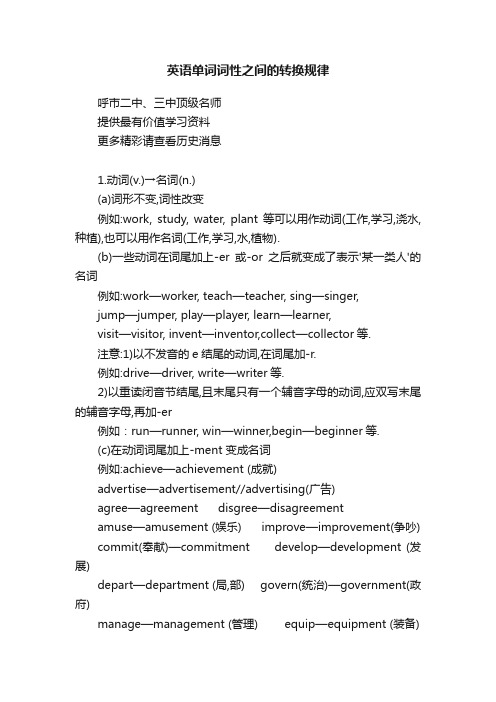
英语单词词性之间的转换规律呼市二中、三中顶级名师提供最有价值学习资料更多精彩请查看历史消息1.动词(v.)→名词(n.)(a)词形不变,词性改变例如:work, study, water, plant等可以用作动词(工作,学习,浇水,种植),也可以用作名词(工作,学习,水,植物).(b)一些动词在词尾加上-er或-or之后就变成了表示'某一类人'的名词例如:work—worker, teach—teacher, sing—singer,jump—jumper, play—player, learn—learner,visit—visitor, invent—inventor,collect—collector等.注意:1)以不发音的e结尾的动词,在词尾加-r.例如:drive—driver, write—writer等.2)以重读闭音节结尾,且末尾只有一个辅音字母的动词,应双写末尾的辅音字母,再加-er例如:run—runner, win—winner,begin—beginner等.(c)在动词词尾加上-ment 变成名词例如:achieve—achievement (成就)advertise—advertisement//advertising(广告)agree—agreement disgree—disagreementamuse—amusement (娱乐) improve—improvement(争吵) commit(奉献)—commitment develop—development (发展)depart—department (局,部) govern(统治)—government(政府)manage—management (管理) equip—equipment (装备)有些单词比较特殊,需把动词后的e去掉再加ment.例如:argue—argument(争论)(d)在动词词尾加上-(t)ion/(s)ion变成名词例如: attract—attraction; instruct—instruction;invent—invention discuss—discussion;express—expression educate—education;graduate—graduation; operate—operation (去e再加'ion')compete—competition; organize—organization (把e改成其他字母再加'tion')decide—decision conclude—conclusion (把de改为s再加'ion')describe—description描写,描绘 (这是特例,不规则变化)(e)在动词词尾加上-ance变成名词例如: appear—appearance (外貌;出现)perform—performance (演出)accept—acceptance (接受)(f)在动词词尾加-ing变成名词 (方法与动词变为现在分词的方法相同)例如:meet—meeting build—building wait—waitingbathe—bathing say—saying(谚语) mean—meaningend —ending train —training wash—washing注意:以重读闭音节结尾,且末尾只有一个辅音字母的动词,应双写末尾的辅音字母,再加-ing如:swim—swimming shop—shopping begin—beginning(g)其他一些比较特殊的变化例如: Beg(乞讨)—beggar(乞丐) behave(行为举止)—behaviorknow(知道)—knowledge(知识) fly—flight (飞行)heat (加热)—heat(热量) hit (撞击)—hit( 轰动一时的人或物,碰撞)mix (混合)—mixture(混合物) press(按,压)—pressure(压力)sit(坐)—seat (座位) succeed—success(成功)tour—tour(旅游)/ tourist (游客)2.动词(v.)→形容词(adj.)(a)动词后面加able,以e结尾的动词则去e加able,表示具有此性质,特点或属性.例如: afford-affordable;love-lovable(b)动词后面加ed,以e结尾的动词则直接加d,表示被动性的属性或特点.例如: scatter-scattered use-used(c)不规则的动词则必须记忆,记住其过去分词形式.规律不大,意义同(b).3.名词(n.)→形容词(adj.)(a)在名词后面加-y可以变成形容词(尤其是一些与天气有关的名词)例如: rain—rainy, cloud—cloudy, wind—windy, snow—snowy, health—healthy, luck—lucky,anger—angry guilt—guilty(内疚的)tourist—touristy(游客多的) , salt (盐)—salty (咸的)silk(丝绸)—silky(丝绸般的), sleep—sleepy (昏昏欲睡的)注意:1)如果以重读闭音节结尾,且词尾只有一个辅音字母,这时应双写辅音字母再加'-y'.如: sun—sunny, fun—funny, fog—foggy(有雾的), fur—furry(毛皮的)2)少数以不发音的e结尾的名词变为形容词时,应去掉e再加'-y'.如: noise—noisy, ice—icy, shine—shiny(发亮的), taste(口味)—tasty(甜的)(b)名词后面加-ed,以e结尾的直接加d.例如: spot(斑点)—spotted(有斑点的); talent—talented (有天赋的)organize—organized 有组织的; balance—balanced(平衡的)(c)一些抽象名词在词尾加-ful可以变为形容词例如:care—careful, thank—thankful, help—helpful,use—useful, meaning—meaningful(d)在名词后加-less构成含有否定意义的形容词例如:care—careless(粗心的), use—useless(无用的)hope—hopeless(没希望的),home—homeless(无家可归的)(e)一些以-ce结尾的名词,把-ce改为-t变成形容词例如: difference—different, silence—silent, confidence—confident(f).在名词后加-ly变为形容词例如: friend—friendly, love—lovely, live---lively(g).在名词后加-ous变为形容词例如: danger—dangerous(h)名词后面加-al变为形容词例如: music—musical; medicine—medical (这个比较特殊)(i)名词后面加-able变为形容词,如果以e结尾就去e再加'-able'.例如: adjust—adjustable 可调整的 value—valuable有价值的(j)名词后面加-en变成形容词例如: wood—wooden 木制的 wool—woolen 羊毛的(k)一些表示国家的名词可以在词尾加-ese, -ish或-n构成表示国籍,语言的形容词例如:China—Chinese, Japan—Japanese, England—English, America—American, India—Indian, Australia —Australian (注意Canada—Canadian)4.形容词(adj.)→副词(adv.)▲一般在形容词的词尾加-ly可以变成副词例如: quick—quickly, slow—slowly, loud—loudly, sudden—suddenly 等但是,以下几点值得注意:(a) 一些以'辅音字母+y'结尾的形容词,要把y改为i再加-ly例如: happy—happily, angry—angrily, lucky—luckily, heavy—heavily, noisy—noisily(b) 有些以-ble或-le结尾的形容词,去掉e加-y例如:possible—possibly, terrible—terribly(c)少数以e结尾的形容词,要去掉e再加-ly例如: true—truly但绝大多数以e结尾的形容词仍然直接加-ly 例如: polite—politely, wide—widely(d)以-l结尾的形容词变为副词时要在词尾加-ly,以-ll结尾的才在词尾只加-y.例如: usual—usually, careful—carefully, useful—usefullyfull—fully (以-ll结尾的才只加y)PS:有些同学可能对元音辅音以及重读闭音节不是很了解,那我在这里再做下补充说明.1.英语26个字母中,a e i o u是元音字母, y是半元音字母, 其余都是辅音字母.★所谓半元音就是有时候做元音,有时候做辅音.半元音字母y做元音有: shy,sky做辅音比如最简单的:yes2.开音节和闭音节开音节分两种:绝对开音节和相对开音节绝对开音节指的是'元音字母结尾'的音节 (例如 we, hi等)相对开音节是指'辅音字母-元音字母-辅音字母-不发音的e'的音节,(r除外). ( 例如,take,make等)比如:take (在这个单词中,t是辅音,a是元音,k是辅音,e是不发音的元音)◆在开音节中, 元音字母发他们在字母表中的音闭音节, 则是指'辅音字母-元音字母-辅音字母'的音节( -al等除外) (例如:leg,cross等)◆在闭音节中,元音字母发不同的音a e i o u例 sat let sit not nut (试着读下这些单词,这些单词中,元音发的音都不是它们在字母表中发的音)2.英语重读闭音节就是以辅音因素结尾的,而且是重读音节的音节.比如apple 划音节就因该是ap/ple 前面那个ap是一个音节,这个音节以辅音因素p结尾,所以就是闭音节.(仅仅能看出是闭音节,是不是重读闭音节还要看这个音节是不是重读的)重读闭音节三要素:1. 必须是重读音节;2. 最后只有一个辅音字母;3.元音字母发短元音 ( 说通俗点,打个比方, /u/是短元音,/u:/是长元音)重读闭音节即两个辅音中间夹一个元音.如:sit---sitting begin---beginning(重读在gin这个音节上)●像travel这个单词,'vel'也是'辅音+元音+辅音'的结构,但是重音不在vel这个音节上,所以不用双写'l',可以为travelled,也可以是traveled,更常用的是后者伟一培训学校初、高中各科周六、日,寒暑假培训呼和浩特市乌兰察布东路校区十八中南门校区两大校区任您选高伟一校长携手二中火箭班教师免费试听分文不收学费从第二次课开始计算高伟一校长为我校课程质量负责。
高中英语词性转换规律归纳
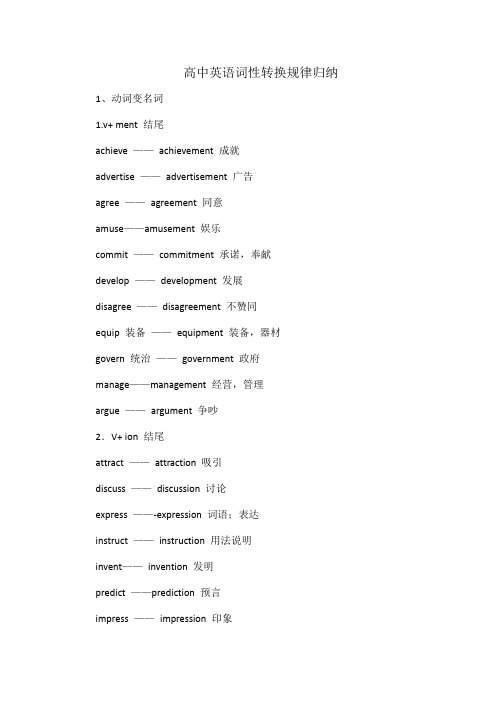
高中英语词性转换规律归纳1、动词变名词1.v+ ment 结尾achieve ——achievement 成就advertise ——advertisement 广告agree ——agreement 同意amuse——amusement 娱乐commit ——commitment 承诺,奉献develop ——development 发展disagree ——disagreement 不赞同equip 装备——equipment 装备,器材govern 统治——government 政府manage——management 经营,管理argue ——argument 争吵2.V+ ion 结尾attract ——attraction 吸引discuss ——discussion 讨论express ——-expression 词语;表达instruct ——instruction 用法说明invent——invention 发明predict ——prediction 预言impress ——impression 印象suggest ——suggestion 建议,暗示educate ——education 教育graduate ——graduation 毕业operate ——operation 操作,动手术illustrate ——illustration 阐明,举例说明pollute ——pollution 污染introduce ——introduction 介绍organize ——organization组织imagine ——imagination 想象力inspire——inspiration 灵感,鼓舞人心的事invite ——invitation 邀请compete ——competition 竞争,比赛pronounce ——pronunciation发音admit ——admission 承认permit ——permission 允许conclude ——conclusion 结论decide ——decision 决定describe ——description描写,描绘resolve ——resolution 决心solve ——solution 解决方法3.V+ ance 结尾allow ——allowance 允许appear ——appearance 外貌,出现perform ——performance 演出exist ——existence 存在4.V+ ing 结尾end ——ending 结尾,结局train ——training训练mean ——meaning 意义say——saying 谚语remind ——reminding提醒bathe ——bathing沐浴5.词尾加-er或-or后变成表示“某一类人”的名词work——worker 工人teach——teacher老师sing——singer 歌手jump——jumper跳高运动员play——player表演者、运动员learn——learner 学习者visit——visitor访问者invent——inventor发明家6.V+ 其他beg——beggar 乞丐sit——seat 座位believe ——belief 信仰behave ——behavior 行为know——knowledge 知识fly——flight 飞行mix ——mixture 混合物press ——pressure 压力serve ——service 服务succeed ——success 成功pursue ——pursuit 追求,从事propose ——proposal 建议withdraw ——withdrawal 取钱;收回;撤退survive ——survival--survivor 幸存者arrive ——arrival到达analyze ——analysis 分析2、形容词变名词1.词尾ent改为ency或enceefficient有效率的——efficiency 效率patient——patience/impatience 耐性/无耐心dependent——dependence依赖性independent——independence 独立性urgent——urgency 紧急2.ble结尾,ble改为bilitypossible——possibility 可能responsible——responsibility 责任;职责3.其他accurate——accuracy 准确性prosperous——prosperity 繁荣true——truth 真相wide——width 宽度long——length 长度high——height 高度3、名词/动词变形容词1.名词+yguilt 罪恶——guilty 内疚的health——healthy 健康的luck——lucky 幸运的cloud——cloudy 多云的wind—windy 多风的rain——rainy 多雨的snow——snowy 多雪的tourist ——touristy 游客多的er结尾,改er为ry hunger——hungry 饥饿的anger ——angry 生气的fog——foggy 有雾的sun——sunny 阳关灿烂的fur——furry 毛皮的shine——shiny 发亮的taste ——tasty 美味的2. 名词/动词+ ed以辅音+辅音结尾的单词,直接加edtalent ——talented 有天赋的offend ——offended 生气的crowd ——crowded 拥挤的以元音字母e结尾的单词直接加dbalance ——balanced 平衡的organize——organized 有组织的pollute ——polluted 被污染的please ——pleased 高兴的元音加辅音结尾的单词,词尾辅音双写再加edspot ——spotted 有斑点的3.名词+ ful/lesscare ——careful/ careless 小心的/ 粗心的help——helpful / helpless 有帮助的/ 无助的use——useful/ useless有用的/ 无用的meaning ——meaningful / meaningless有意义的/无意义的colour——colourful /colourless多彩的/无色的pain 疼痛——painful /painless痛苦的/ 不痛的thank——thankful / thankless 充满感激的/ 不知感恩的peace 和平——peaceful 和平的play游戏——playful 爱玩耍的home ——homeless 无家可归的4.名词/动词+ ablechange ——changeable 易变的adjust——adjustable 可调整的comfort——comfortable 舒适的knowledge——knowledgeable 知识渊博的suit ——suitable 合适的动词以辅音加y结尾把y变i 加able ,deny——deniable 可否认的rely——reliable 可靠的5.名词+ ouscourage——courageous 勇敢的danger——dangerous 危险的以y结尾,改y为i再加ousmystery 神秘——mysterious 神秘的6.ce 变tconfidence——confident 自信的difference——different 不同的dependence ——dependent 依赖他人的independence——independent 独立的7.词尾加aladdition——additional 附加的,额外的music——musical 音乐的person——personal (私人的) nation——national 国家的education——educational有教育意义的tradition——traditional 传统的origin起源——original 新颖的;独创的以元音字母e 结尾的单词,去掉词尾元音加al nature——natural 自然的globe——global 全球的特例:class——classical 经典的medicine 药——medical 医学的grammar——grammatical 语法的8.名词+ lyfriend——friendly 友好的live——lively 活跃的,有生气的love——lovely 可爱的week——weekly 每周的man——manly 男子气概的;强壮的9.词尾+ enwood——wooden 木制的wool——woolen 羊毛的10. 表示方位的词East——easternWest——westernSouth——southernNorth——northern11.四大洲Asia 亚洲——AsianAfrica 非洲——AfricanEurope欧洲——EuropeanAmerica 美洲——American12. 其他energy精力——energetic 精力充沛的strategy——strategic 战略的scientist——scientific 科学的fool 傻子——foolish 愚蠢的love——loving 慈爱的pleasure——pleasant令人愉快的/ pleased高兴的pride——proud 自豪的4、形容词变动词1.词尾加ize modern——modernize 使...现代化social——socialize 使...社会化2.词尾加enfast——fasten 使固定;集中于short——shorten 缩短wide——widen 放宽less——lessen 使...减少特例(有变形):long——lengthen 使延长strong ——strengthen 加强;巩固3.词前加enlarge ——enlarge 扩大;放大5、形容词变副词1.形容词+ lybad——badly 坏地bright——brightly 明亮地casual——casually 随意地clear——clearly 清楚地complete——completely 完全correct——correctly 正确地final——finally 最后fortunate——fortunately幸运地general——generally 一般来讲loud——loudly 大声地particular ——particularly特别地polite——politely 礼貌地proper ——properly适当地main——mainly 主要地most ——mostly 多半,大多数normal——normally 正常地quick——quickly 迅速地quiet——quietly 轻轻地,安静地real——really 真正地recent ——recently 最近;近来sad——sadly 悲哀地slow——slowly 缓慢地special——specially 专门,特殊地specific——specifically 特定地,明确地strong——strongly 坚决地,强烈地sudden——suddenly突然usual——usually 通常2. 以le 结尾的,去e + y comfortable——comfortably 舒服地gentle——gently 温柔地possible——possibly 可能地simple——simply 仅仅;只;简单地terrible——terribly 非常;极度地3. 辅音字母+ y 变y为ily easy——easily 容易地heavy——heavily 沉重地happy——happily 快乐地4.特殊good——well好地true——truly 真实地。
- 1、下载文档前请自行甄别文档内容的完整性,平台不提供额外的编辑、内容补充、找答案等附加服务。
- 2、"仅部分预览"的文档,不可在线预览部分如存在完整性等问题,可反馈申请退款(可完整预览的文档不适用该条件!)。
- 3、如文档侵犯您的权益,请联系客服反馈,我们会尽快为您处理(人工客服工作时间:9:00-18:30)。
高考词汇词性变化规律1名词类变化
词性变化之名词类
1. 以后缀-ce结尾的名词后缀变为以-ent后缀结尾的形容词confidence→confident 自信的
difference→different 不同的
evidence 证据→evident 明显的
independence→independent 独立的
intelligence 智力→intelligent 聪明的
patience→patient 有耐心的
silence→silent 沉默的
violence→violent 暴力的
2. 以后缀-ency结尾的名词变为以-ent后缀结尾的形容词emergency →emergent 紧急的
fluency →fluent 流利的;流畅的
frequency 频率→frequent 频繁的
efficiency→efficient 有效率的
3. 名词+-y 后缀变为形容词
anger→angry 生气的
cloud→cloudy 多云的
dirt→dirty 脏的
dust→dusty 布满尘土的
ease→easy 容易的;安易的fog→foggy 有雾的
frost→frosty 结霜的;严寒的greed→greedy 贪吃的;贪婪的guilt→guilty 内疚的;有罪的health→healthy 健康的hunger→hungry 饥饿的
ice→icy 结冰的
mess→messy 杂乱的
mist→misty 有雾的
noise→noisy 吵闹的;嘈杂的salt→salty 咸的
sleep→sleepy 困的
snow→snowy 有雪的
storm→stormy 暴风雨的
sun→sunny 晴朗的
taste→tasty 可口的;好吃的thirst→thirsty 渴的;渴望的wealth→wealthy 富有的
wind→windy 有风的
4. 名词+-ly 后缀变形容词
year→yearly 每年的
brother→brotherly 兄弟般的
day→daily 每天的
friend→friendly 友好的
month→monthly 每月的
quarter→quarterly 每季的
week→weekly 每周的
5. 名词+-al 后缀变为形容词agriculture→agricultural 农业的benefit→beneficial 有益的commerce→commercial 商业的2 convention→conventional 传统的culture→cultural 文化的environment→environmental 环境的face→facial 表面的
music→musical 音乐的
nation→national 国家的
nature→natural 自然的;天然的office→official 官方的
origin→original 原来的
profession→professional 专业的season→seasonal 季节的;季节性的society→social 社会的
tradition→traditional 传统的
6. 名词+-ous 后辍变为形容词adventure→adventurous 冒险的danger→dangerous 危险的humour→humorous 幽默的mountain→mountainous 多山的poison→poisonous 有毒的
7. 动词+-er 后缀变为指物的名词cooker 炊具
counter 柜台
drawer 抽屉
receiver 听筒;话筒
speaker 扬声器
typewriter 打字机
8. 名词加后缀-ician 表示人electrician n.电工
magician n.魔术师
musician n.音乐家
physician n.内科医生
politician n.政治家
technician n.技术员
9. 以-ist 后缀结尾的名词,表示人,...家,...者art→artist 艺术家
biology→biologist 生物学家
journal→journalist 新闻工作者;记者physics→physicist 物理学家
piano→pianist 钢琴家
psychology→psychologist 心理学家science→scientist 科学家
social→socialist 社会主义者
special→specialist 专家
tour→tourist 游客
10. 以后缀-ology结尾的名词,表示...学archaeology 考古学
biology 生物学
ecology 生态学
geology 地质学
psychology 心理学
sociology 社会学
technology 技术;工艺
11. 名词+-ic 后缀结尾,变为形容词drama→dramatic 戏剧(性)的
energy→energetic 精力充沛的enthusiasm→enthusiastic 热情的romance→romantic 浪漫的
science→scientific 科学的
sympathy→sympathetic 同情的
12. 名词+-hood 后缀变为名词
adult→adulthood 成年
boy→boyhood 少年时代
brother→brotherhood 手足之情
child→childhood 童年
man→manhood 男子气概
neighbour→neighbourhood 邻里;街坊13. 名词+-ship 后缀结尾,变为抽象名词
championship 冠头军衔friendship 友谊
hardship 困苦;苦难leadership 领导地位;领导才能membership 成员资格relationship 关系scholarship 奖学金。
